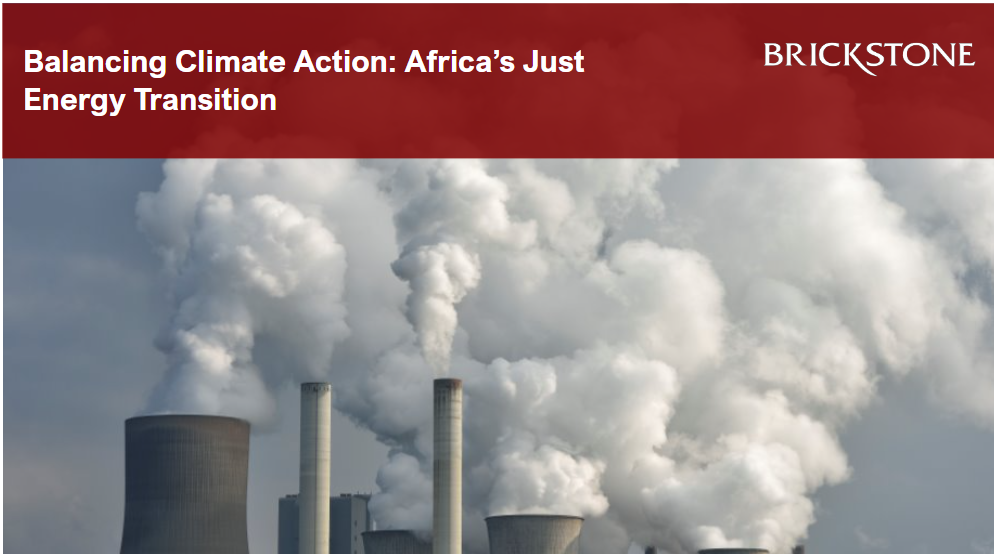Balancing Climate Action: Africa’s Just Energy Transition
Balancing Climate Action: Africa’s Just Energy Transition
The report, Just Energy Transitions and Natural Gas in Africa, explores the critical role of natural gas in Africa’s energy transition, assessing the opportunities and risks associated with its continued exploitation amid global climate imperatives. Africa holds significant natural gas resources, with substantial discoveries made over the last decade, particularly in countries like Mozambique and Tanzania. For established producers like Algeria, Nigeria, and Egypt, natural gas is a major source of foreign revenue and crucial for meeting domestic energy needs. However, the global shift towards cleaner energy sources poses considerable risks to long-term investments in natural gas infrastructure.
The report highlights that short- to medium-term changes in global liquefied natural gas (LNG) markets—largely influenced by Europe’s quest for alternative gas sources following Russia’s invasion of Ukraine—will soon give way to longer-term dynamics driven by global energy transitions. Investments in gas infrastructure are becoming riskier as renewable energy costs fall, and many global scenarios that aim to limit global warming to 1.5°C suggest a significant decline in gas usage by 2050. Although gas has been touted as a lower-carbon alternative to coal, methane leaks and carbon dioxide emissions from gas infrastructure raise concerns about its greenhouse gas (GHG) intensity. These factors challenge the economic viability of large-scale investments in gas projects.
6 Key Insights from Just Energy Transition and Natural Gas in Africa
Natural Gas as a Short-Term Opportunity but a Long-Term Risk: Africa’s gas resources are seen as an opportunity to meet Europe’s short-term energy needs due to the disruption caused by the war in Ukraine. However, long-term prospects for gas are increasingly uncertain due to the global shift towards renewable energy. Europe’s transition away from fossil fuels, including natural gas, threatens the long-term viability of gas infrastructure investments in Africa. Projects that aim to meet Europe’s gas needs today may become stranded assets as demand shifts to cleaner alternatives.
Economic Viability of Gas Infrastructure: The report outlines several factors influencing the economic viability of gas projects, such as available reserves, infrastructure development timelines, and the payback periods for these projects. A crucial consideration is the ability of African countries to balance trade-offs between gas exports and domestic utilization. For example, Algeria has to navigate the growing domestic demand for natural gas while maintaining export revenues, which creates tension between serving local needs and international markets.
Domestic Gas Utilization and the Export vs. Domestic Dilemma: While many African countries have focused on exporting natural gas to global markets, the report underscores the importance of utilizing gas for domestic energy needs. Domestic gas use, primarily for power generation and industrial applications, is constrained by limited infrastructure. Countries like Mozambique have introduced Domestic Supply Obligations (DSOs) to ensure that some gas is reserved for local markets, but enforcement has been inconsistent. Additionally, domestic gas markets face challenges such as the need for subsidized pricing to make gas affordable, which can reduce the competitiveness of exports.
Impact of Global Energy Transitions on Gas Demand: The global push towards achieving net-zero emissions by 2050 will necessitate a significant reduction in fossil fuel consumption, including natural gas. International climate targets are expected to dampen global demand for gas, making large-scale investments in gas infrastructure risky. The report highlights that future demand for African gas will be heavily influenced by the speed of global energy transitions, especially in Europe and Asia.
The Role of Renewable Energy in Africa’s Future: Given the risks associated with natural gas investments, the report advocates for greater attention to renewable energy (RE) as a more sustainable option for electrification, industrialization, and economic diversification. Africa has vast renewable energy resources, particularly solar and wind energy, which can be deployed more quickly and affordably compared to large gas projects. RE technologies also offer the potential to drive job creation and economic development, especially in rural areas. However, the expansion of renewable energy in Africa will depend on the availability of climate finance and private-sector investment.
The Challenge of Climate Finance: Watering renewable energy in Africa requires substantial financial investment. The report emphasizes the need for international climate finance and private sector support to achieve large-scale renewable energy deployment. Without significant financial backing, African countries may struggle to transition to clean energy and remain dependent on fossil fuels for economic growth.
Takeaways from Just Energy Transition and Natural Gas in Africa
Africa is at a crossroads in its energy development, with natural gas offering short-term benefits but significant long-term risks due to the global transition to low-carbon economies.
While gas exports may provide revenue in the short term, they are not a sustainable solution for Africa’s long-term energy needs. Countries must prioritize domestic energy access and shift towards renewable energy to ensure sustainable development.
The cost of renewable energy technologies is falling, and they present a viable alternative to gas in meeting Africa’s energy needs. However, the expansion of renewable energy depends on access to climate finance and investments in infrastructure.
African governments must carefully consider the trade-offs between investing in gas infrastructure and the risks of stranded assets, especially as global demand for gas declines in the coming decades.
In conclusion, Just Energy Transitions and Natural Gas in Africa provides a balanced view of the opportunities and challenges associated with natural gas development in Africa. The report calls for a shift towards renewable energy, supported by climate finance and international cooperation, to ensure that Africa’s energy transition is both sustainable and equitable. While natural gas may serve as a short-term solution for some countries, the long-term focus must be on building resilient, low-carbon energy systems that can power Africa’s economic growth for decades to come.
This article by Brickstone reviews the African Climate Foundation publication on Just Energy Transitions and Natural Gas in Africa: Balancing Climate Action and Structural Transformation
Read the complete publication here





